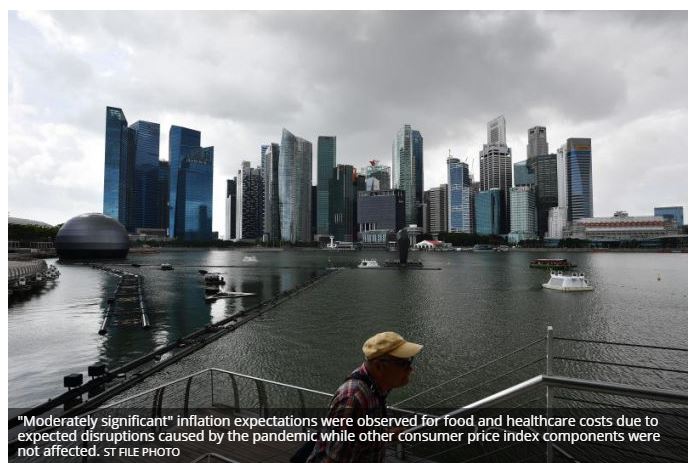Singaporeans’ headline inflation expectations fall to 3% for coming year: DBS-SMU poll
SINGAPOREANS’ headline inflation expectations for the year ahead declined slightly to 3 per cent in a June poll, down from 3.1 per cent in March, according to findings of the latest quarterly survey for the Singapore Index of Inflation Expectations (SInDEx) released on Monday by DBS and the Singapore Management University (SMU).
The June figure was slightly lower than the Q2 average of 3.3 per cent since the survey’s inception in 2012. Overall inflation expectations remained unchanged at 2.9 per cent in June compared to March.
The SInDEx is derived from an online survey of around 500 randomly selected individuals representing a cross-section of Singapore households.
DBS and SMU said in a joint statement that the June SInDEx poll included an in-depth survey on the potential impact of the Covid-19 pandemic on inflation expectations of different components of consumer price index (CPI) inflation.
Overall, “moderately significant” inflation expectations were observed for food and healthcare costs due to expected disruptions caused by the pandemic. Other CPI components were not affected.
DBS and SMU added that there was a divergence of views among survey respondents on the pandemic’s impact on overall inflation expectations, with about half the respondents expecting a positive impact, and the other half expecting a negative impact.
Excluding the more volatile components of accommodation and private transport costs, core inflation expectations for the year ahead edged up to 3.2 per cent in June from 3.1 per cent in March.
This could “perhaps be attributed to the increased level of uncertainty, particularly related to a cognitive dissonance in terms of the impact of the Covid-19 crisis on the dislocation of supply chains once the economy reopens”, DBS and SMU said.
Core inflation expectations for the year ahead were lower at 2.8 per cent for a subgroup of the population who own their accommodation and use public transport, down from 2.9 per cent in March.
“Not being exposed to private road transportation or accommodation expenses, this subgroup’s expectations of core inflation closely resemble the Singapore core inflation expectations,” DBS and SMU said.
They added that the divergence in views of the subgroup compared to overall core inflation expectations was “probably due to the heightened level of uncertainty prevalent in the economy with an overall modest downward trend in inflation expectations”.
Aurobindo Ghosh, assistant professor of finance (education) at SMU’s Lee Kong Chian School of Business and leader of the SInDEx survey, said it was “hardly surprising” that Singaporeans were “treading cautiously about future prospects of price changes”.
“This can explain the divergence in views on the impact of Covid-19 on the Singapore core inflation expectations with [a] temporary price increase expected in components like food and healthcare, the former possibly being impacted by supply chain dislocations and the latter due to longer-term impact of Covid-19,” he said.
“In general, consistent with other academic studies on survey-based instruments, Singaporeans’ inflation expectations seem to be capturing the direction of movement better than the level of inflation,” Prof Ghosh added.
The survey found that eight in 10 respondents believed that the Covid-19 pandemic’s impact on inflation would be “significant”, with 78.6 per cent saying it would have a significant impact on the economy.
Around 13 per cent of those polled expected salary reductions of over 10 per cent in the next 12 months, with median salary increment expectations falling between -1 per cent and 1 per cent.
Respondents’ expectations around salary increments and their belief in the duration of the pandemic’s impact seemed unrelated, DBS and SMU said.
SMU’s Sim Kee Boon Institute for Financial Economics (SKBI) principal researcher Thomas Lam said that the proportion of respondents in favour of preserving jobs and the economy was more than twice as large as those who valued unconditional public health measures.
About four out of seven respondents viewed safeguarding the population, especially vulnerable groups, as viable only in the short to medium term not beyond one year, he added.
DBS chief economist and managing director of group research Taimur Baig said that Singaporeans were “facing difficult and uncertain economic circumstances, which would likely weigh on their expectation of employment and wages in the near term”.
He added that while sentiments could have stabilised to some extent due to multiple support packages from the government, the survey findings were “consistent with the narrative of well-anchored expectations undergoing a downward drift”.
The SInDEx survey is led by Prof Ghosh. DBS Group Research is a co-sponsor and research partner, together with SKBI.
Source: https://www.businesstimes.com.sg/government-economy/singaporeans-headline-inflation-expectations-fall-to-3-for-coming-year-dbs-smu


 English
English




